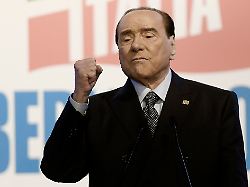Like no other, Silvio Berlusconi not only shaped Italian politics, but also everyday life and social change in Italy. He was a reflection of Italy, for better or for worse.
When the news broke on Friday that Silvio Berlusconi was back in the hospital, very few believed the official version that these were early routine examinations. The 86-year-old was only released from the hospital on May 19 after almost two months. The news came this morning: Berlusconi is dead.
The “Cavaliere”, the cavalier and knight, as Berlusconi was called half ironically, half respectfully in Italy, was undoubtedly the most dazzling political figure of the Italian post-war period. No politician won people over like he did and at the same time alienated others so much. Some loved him unconditionally, others hated him just as passionately. His followers forgive him for everything: lies, conflicts of interest, tax evasion and also the Bunga Bunga affair, which involved sex parties and the suspicion that underage girls had also been brought to the guests. Many saw Berlusconi’s weaknesses as mirroring their own.
Instead, for his opponents, he was Italy’s damnation, a phony with no respect for the institutions, who only had his own interests and business in mind. From this point of view, he and his television stations were an expression of political and social brutalization.
Politics becomes a show
The “Tangentopoli” corruption scandal in the early 1990s paved the way for Berlusconi to enter politics. As a result of these revelations, the party system collapsed completely, and the Socialists and Christian Democrats were swept away. Berlusconi, at that time not only a successful building contractor, but also a national media tycoon with three private TV stations, one daily and one weekly newspaper, seized the opportunity. On January 25, 1994, he addressed Italians through his television network with the following video message: “Italy is the country I love, this is where my roots are. It is in Italy that I place my hopes and my future. I go into politics because I don’t want to live in an illiberal country.”
He presented himself as a bulwark against the communists and promised to put Italy on a liberal course politically and economically and make it a country where everyone could achieve their dream. That wasn’t the case then. Despite this, the Italians elected him Prime Minister four times between 1994 and 2011.
When Berlusconi had to hand over his office as Prime Minister to Mario Monti in 2011, the daily newspaper “Il Foglio”, which belonged to Berlusconi’s brother, said that the change of office was understandable, but somehow also a shame, because politics with Berlusconi was “entertaining”. been. In fact, the Cavaliere had turned everyday political life into a one-man show. This example was followed by others, such as the comedian Beppe Grillo, founder of the Five Star Movement, or the Florentine mayor Matteo Renzi, whom Berlusconi would have liked to have adopted as his foster son.
Who will be Berlusconi’s political heir?
Instead, the slow departure began for Berlusconi. In 2013 he was sentenced to four years in prison for embezzlement, tax evasion and accounting fraud in his media empire Mediaset. But giving up was not an option for him, he kept dreaming of a comeback. In 2019 the time had come, the six years of his legally binding ban from politics had passed. He was elected to the EU Parliament in 2020, and returned to the Senate last year.
He was aware that Berlusconi would no longer be prime minister, but that Prime Minister Giorgia Meloni repeatedly turned him down hurt him deeply. He saw himself in the role of the venerable statesman who could open the doors to the mighty of the world for her. When she refused him this role, he reacted defiantly and tried to put obstacles in her way. For example, by publicly defending Russian President Vladimir Putin and thereby opposing Meloni.
Looking back, it was a sad goodbye. What will become of his political legacy is difficult to say. He was the head of his party Forza Italia until the very end, and he did not set up a successor. According to rumors, his daughter Marina, 56 years old and chairman of the financial holding company Fininvest, could follow in his political footsteps. However, she herself has not commented on this.
